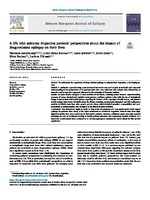Repositorio Digital
A life with seizures: Argentine patients’ perspectives about the impact of drug-resistant epilepsy on their lives
- DSpace Principal
- →
- Hospital El Cruce
- →
- Publicaciones
- →
- Artículos
- →
- Ver ítem
JavaScript is disabled for your browser. Some features of this site may not work without it.
Mostrar el registro sencillo del ítem
| dc.contributor.author | Sarudiansky, Mercedes | |
| dc.contributor.author | Korman, Guido Pablo | |
| dc.contributor.author | Scevola, Laura | |
| dc.contributor.author | Oddo, Silvia | |
| dc.contributor.author | Kochen, Silvia | |
| dc.contributor.author | D'Alessio, Luciana | |
| dc.date.accessioned | 2019-03-07T18:36:57Z | |
| dc.date.available | 2019-03-07T18:36:57Z | |
| dc.date.issued | 2018 | |
| dc.identifier.citation | Seizure. 2018 Dec;63:52-61. doi: 10.1016/j.seizure.2018.10.008. Epub 2018 Oct 23. | es_AR |
| dc.identifier.other | 10.1016/j.seizure.2018.10.008 | |
| dc.identifier.uri | https://www.sciencedirect.com/science/article/pii/S105913111830534X | |
| dc.identifier.uri | http://repositorio.hospitalelcruce.org/xmlui/handle/123456789/767 | |
| dc.description | Fil: Sarudiansky M. CAEA, CONICET, Buenos Aires, Argentina; Epilepsy Centre, Ramos Mejia and El Cruce Hospital, Argentina; School of Psychology, University of Buenos Aires, Argentina. | es_AR |
| dc.description.abstract | PURPOSE: To understand the experience of drug-resistant epilepsy in patients from Argentina, a developing nation. METHOD: A qualitative approach using semi-structured interviews was used to gain an in-depth and contextual understanding of the perspectives of 20 patients with DRE. Data collection and analysis were followed by an inductive and interpretive approach informed by the principles of thematic analysis. RESULTS: Six main themes emerged: 1) Characteristics of the illness, including seizure features -unpredictability, presence of auras, physical and cognitive consequences- and how patients relate with the use of antiepileptic drugs; 2) interactions with health system, regarding the features of the Argentine's health system, and patient's health-seeking behaviours; 3) beliefs about the illness, including psychosocial, biological and folk explanatory models; 4) beliefs about how other people perceive them, which included prejudice, responsibility and overprotection; 5) self-perception, and 6) impact of the illness on their activities. CONCLUSIONS: This information might be useful to help in the development of a conceptual model of the impact epilepsy on patients' lives. Many of the topics mentioned as relevant in Argentina coincide with those highlighted in studies that were carried out in first-world countries. However, additional topics were also reported including the role of traditional healing in health-seeking behaviour and explanatory models of illness. It is important to understand these perspectives to develop appropriate psychosocial interventions for this specific population. | es_AR |
| dc.language.iso | en_US | es_AR |
| dc.publisher | Seizure | es_AR |
| dc.relation.ispartofseries | Seizure;2018 Dec;63:52-61 | |
| dc.subject | Convulsiones | es_AR |
| dc.subject | Seizures | es_AR |
| dc.subject | Investigación Cualitativa | es_AR |
| dc.subject | Qualitative Research | es_AR |
| dc.subject | Argentina | es_AR |
| dc.subject | Epilepsia Refractaria | es_AR |
| dc.subject | Drug Resistant Epilepsy | es_AR |
| dc.title | A life with seizures: Argentine patients’ perspectives about the impact of drug-resistant epilepsy on their lives | es_AR |
| dc.type | Article | es_AR |
Ficheros en el ítem
Este ítem aparece en la(s) siguiente(s) colección(ones)
-
Artículos
Articles

